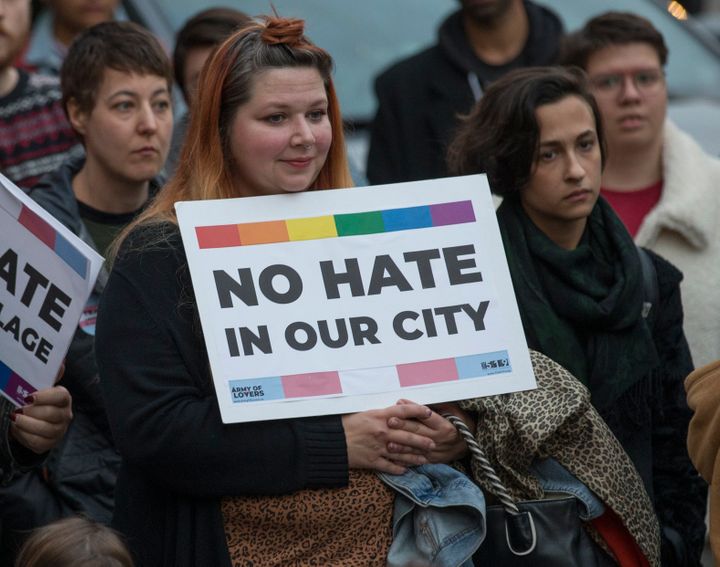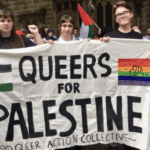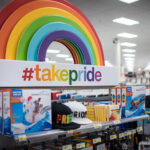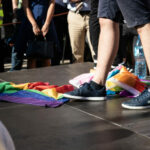Blog Post
LGBT activist warns that Pride’s attacks on freedom of expression will create backlash
Here’s something that doesn’t happen very often: A self-described LGBT activist is defending freedom of expression in the National Post after Halifax Pride made a showy announcement about boycotting the Halifax Public Library after they declined to pull a book from their shelves as Pride demanded. The book—Irreversible Damage: The Transgender Craze Seducing Our Daughters by Abigail Shrier, is an exposé of the trans movement and specifically a condemnation of the experiment currently being performed on thousands of children. Trans activists have been trying to get it suppressed and pulled from library shelves.
This boycott, says Adam Zivo, “is part of a disturbing pattern of Canadian pride festivals penalizing library systems for defending freedom of expression.” More:
In 2019, Meghan Murphy, a writer frequently accused of transphobia, was invited to speak at a third party event hosted at the Toronto Public Library. In response, Pride Toronto published an open letter melodramatically stating that “there will be consequences to our relationship for this betrayal.” That same year, Vancouver Pride banned its local library system from the parade for allowing Murphy too book space for an event.
Whether squelching speakers or banning books, the underlying issue is how we treat freedom of expression in our institutions — because what is book banning but another imposition on a thinker’s right to expression?
Pride Festivals, along with many LGBTQ activists, believe that they have the right to police what views are allowed to publicly exist, or what ideas people have access to. As an LGBTQ activist myself, I find this behaviour disappointingly reckless. LGBTQ activists should, by all rights, be enthusiastic supporters of freedom of expression — especially for views considered unpopular and harmful. Why is it that so many activists forget how integral that freedom has been to their own success?
Zivo points out that gay events and publications were once suppressed, before courts ruled that they had freedom of expression. But now that the LGBT movement has seized cultural dominance, their liberal principles have suddenly vanished. Zivo:
In an ideal world, activists would recognize that just because their community no longer benefits from a universal principle, and is even inconvenienced by it, it doesn’t mean that it should be cynically abandoned. What do principles matter if they are only defended so long as they are useful to you?
Of course, freedom of expression has its limits, though the details differ by medium — you can find Mein Kampf in the library, but you can’t give a Hiterlite speech there.
When LGBTQ organizations try to de-platform people and ban books at libraries, they claim the right to reject government definitions of unacceptable hate (which are carefully formulated) and instead define that themselves, unilaterally, without consulting wider society, and without an accessible or accountable discussion on what that new definition should be and why its benefits outweigh its costs.
Everyone has the right to define unacceptable hate however they want in their private lives, but when you try to impose that on the government and weaponize state power, that’s a different story and requires wider societal and legal consultation. If you want something deemed too hateful to be public, then properly lobby for that — coercive bans and quasi-mafioso references to “consequences” are unproductive and juvenile.
Relatedly, if LGBTQ activists are confident that their opponents are wrong, then they should do the work of persuading people about why that is, allowing individuals to freely judge for themselves. This is a basic duty of activism — the duty to persuade — and Canadian pride festivals have been abdicating that duty.
If you are unwilling or unable to engage someone who is outside of your support base, the solution is not to paternalistically limit their access to information. Yet that is what is happening because persuasion is out of vogue, having been displaced by activism that whines about “emotional labour” and dispenses catch-phrases like “it’s not my job to educate you.” Why anyone thinks it’s clever to raise artificial barriers to disseminating knowledge about your rights is beyond me.
The result has been a widespread backlash against LGBTQ rights. An infamous 2019 GLAAD study showed Americans, especially younger ones, have become more uncomfortable with LGBTQ people (the study has since been discontinued). As I’ve written about before, it turns out that when you suppress outward articulations of belief, while leaving people unchanged on the inside, you create resentment and discomfort. Who would have thought?
When LGBTQ organizations advocate for banning books, they lean into the bull-headedness that has been fuelling the backlash against them, endangering the communities that they represent.
Having taken it for granted that whatever progress they’ve won will last in perpetuity, many members of the LGBTQ community also discount the possibility that they might benefit from freedom of expression again in the future. Yet, given the aforementioned backlash against their rights, that’s a risky assumption to make — not necessarily in the near future, but very possibly in the long view.
Finally, freedom of expression will surely be essential for other groups that, while currently stigmatized, may eventually earn social acceptance in the future — much as LGBTQ people did over the past few decades. Since evolutions in social and moral norms are unpredictable, this freedom needs to be given widely and neutrally so all groups can equally advocate for themselves (whether that advocacy succeeds is another question). Inviting more limitations on thoughts and words endangers that..
Ultimately, this policing of public thought, and eagerness to coerce rather than persuade, is questionable in more ways than commonly given credit for. Not only is it offensive to the core values of Canadian society and liberal democracy, it is manifestly hypocritical in a historical context, and, above that, endangers both LGBTQ people and future marginalized groups. Freedom of expression is crucial. There’s no need to throw it in the mud because of a tantrum.
Adam Zivo is a member of a small group of LGBT activists who actually believe in liberal principles. Andrew Sullivan, the gay activist who did much to mainstream the idea of same-sex marriage, is another that has been banished by the LGBT community for his views on religious freedom. So has Jonathan Rauch. Sullivan in particular was a transformational figure for the gay rights struggle, but has been abandoned and repudiated because he actually meant what he said when he claimed that religious liberty and gay rights could co-exist. Sullivan believed it—the movement he represented did not, and does not. I hope the voices of folks like Zivo and Sullivan prevail. I doubt they will.
***
For those interested, here’s my conversation with Abigail Shrier:









They banned the Vancouver library from a pride parade in 2019 because it didn’t censor a feminist speaker.
https://www.cbc.ca/news/canada/british-columbia/vancouver-pride-bans-library-from-parade-over-event-featuring-transphobic-activist-1.5221943